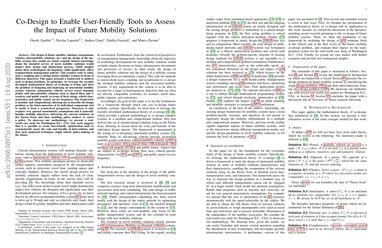Co-Design to Enable User-Friendly Tools to Assess the Impact of Future Mobility Solutions
The design of future mobility solutions and the design of the mobility systems they enable are closely coupled. Indeed, knowledge about the intended service of novel mobility solutions would impact their design and deployment process, whilst insights about their technological development could significantly affect transportation management policies. This requires tools to study such a coupling and co-design mobility systems in terms of different objectives. We present a framework to address such co-design problems, leveraging a mathematical theory of co-design to frame and solve the problem of designing and deploying an intermodal mobility system, whereby autonomous vehicles service travel demands jointly with micromobility solutions and public transit, in terms of fleets sizing, vehicle characteristics, and public transit service frequency. Our framework is modular and compositional, allowing one to describe the design as the interconnection of simple components and to tackle it from a systemic perspective. Moreover, it requires general monotonicity assumptions and naturally handles multiple objectives, delivering rational, actionable solutions for policy makers. We showcase our methodology in a case study of Washington D.C., USA. Our work suggests the possibility to create user-friendly optimization tools to systematically assess costs and benefits of interventions, and to inform policy-making in the future.
PDF Abstract

